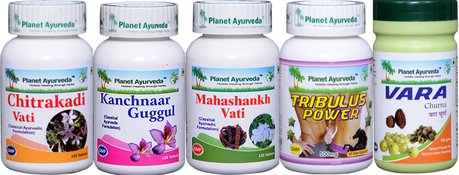Introduction
A hernia is defined as a disorder in which a fatty tissue or an organ squeezes through fascia which is a weak spot in the surrounding connective tissue or muscle. In simple words Hernia is a condition during which any internal organ which is present in Abdomen get displaced from its normal position and starts growing outwards.
Ayurveda relates the problem of Hernia with 'Antra Vriddhi'. Hernia is one of the most common problems which is usually pain-free and harmless but sometimes Hernia can bring pain and discomfort.

Types of Hernia
Hernia is of six different types
- Inguinal Hernia
- Incisional Hernia
- Femoral Hernia
- Umbilical Hernia
- Hiatal Hernia
- Diaphragmatic Hernia
1. Inguinal Hernia
It is also considered as inner groin. In this type of Hernia, bladder or intestine grows through the wall of abdominal or sometimes they may protrude into the inguinal canal which is present in the groin. More than 95% of Hernias are inguinal Hernia, and men are more to this Hernia as compared to women due to the natural weakness of this area.
Signs and Symptoms of Inguinal Hernia
- Bulge with Aching or Burning sensations.
- Groin with Dragging or Heavy sensation especially when Lifting, Coughing and Bending over.
- Swelling and Pain around or in the testicles.
2. Incisional Hernia
During this type of Hernia, the intestine passes through the wall of the abdominal and arises at the previous site of Abdominal surgery. This type of Hernia is most common in Overweight or elderly individuals who are inactive after their surgery of abdominal.
Signs and Symptoms of Incisional Hernia
- Discomfort
- Pain and Swelling
- Protrusion or Bulge may be visible.
3. Femoral Hernia
This type of Hernia occurs when the intestine enters into the femoral canal (small nerves and veins) that carries the femoral artery towards the Upper part of thigh. Femoral Hernias are more common in females as comapred to males, especially in those females who are Obese and Pregnant.
Signs and Symptoms of Femoral Hernia
- Discomfort
- Pain and Swelling
- Protrusion or Bulge may be visible.
4. Umbilical Hernia
In Umbilical Hernia, a small part of the small intestine protrudes near the navel through the wall of abdominal. This type of Hernia ismore common in infants or newborns and it also affects those obese females who are mothers of many children.
Signs and Symptoms of Umbilical Hernia
- Bulge or Swelling (soft) near Umbilicus.
- Discomfort
5. Hiatal Hernia
The Hiatal hernia is an another type of Hernia that mainly occurs when the upper part of the stomach squeezes through the opening of the diaphragm which is commonly known as Hiatus. Through this opening the Esophagus usually passes.
Signs and Symptoms of Hiatal Hernia
- Pain in the chest
- Discomfort
- Burning of Heart
- Belching and Nausea
6. Diaphragmatic Hernia
This type of Hernia is also known as Birth defect Hernia. Diaphragmatic Hernia mainly occurs when an abnormal opening is present in the muscles present between the abdomen and chest.
Signs and Symptoms of Diaphragmatic Hernia
Causes of Hernia
There are multifarious reasons behind the occurrence of Hernia. Few of them are as follows
- Coughing,
- Lifting heavy objects
- Being Obese or Overweight
- Smoking
- Abdominal fluid
- Persistent cough
- Enlargement of the Prostate Gland
- Cystic fibrosis
- Poor Nutrition
- Cryptorchidism (Undescended Testicle)
Diagnosis of Hernia
The diagnosis of hernia is done by a doctor through physical examination. The doctor may check for a bulge or swelling in the groin area. If the physical examination is unable to tell about condition doctor might recommend some imaging tests like a CT scan,MRI and Abdominal ultrasound.
Management of Hernia without any Surgery
It is often seen that most of the Allopathic doctors recommend surgery for the treatment of Hernia but surgery or operation is not a suitable choice of management because it may cause different types of complications such as difficulty or inability of urinating, Seroma formation and Hernia recurrence. Pain and Discomfort that are the main symptoms of Hernia caused due to the chronic inflammation and with the help of surgery chronic inflammation is not treated. Also, Surgery is quite expensive. But there is no need to worry because the problem of hernia can be treated without surgery with the help of Ayurvedic medicines.
Planet Ayurveda is an Ayurvedic company that has a specialty of producing pure as well as natural herbal remedies. This organization recommends a pack of remedies that contain five products that can easily treat Hernia. The products are prepared by following the principles of Ayurvedic medicine system under the strict surveillance of Ayurvedic doctors. All the products are 100% Pure as well as Authentic and they do not contain any Additives, Flavoring agent, a Coloring agent, and Yeast, etc. These products are available in other countries such as Canada, Australia, Singapore, and the USA.


Products Description
1. Mahashankh Vati
These tablets are prepared from the herbs of Hingu, Pippali mool, Shunti, Pippali, Marich, Chitraka, Shuddha Vatsanabha, Panch Lavana, Shankha Bhasma, and Danti Mool that are very effective in the management of Hernia.
Dosage: 2 Tablets with plain water, 2 times a day after 30 mins of meals.
2. Chitrakadi Vati
These tablets are formulated after combing different types of herbs such as Plumbago zeylanica, Piper longum, Piper Chaba, Piper nigrum, Zingiber officinale, Trachyspermum roxburghianum, and Ferula asafoetida, etc. These tablets are very effective in the treatment of digestion that mainly occurs during Hernia and this product is very useful in reducing the symptoms of Hernia.
Dosage: 2 Tablets with plain water, 2 times a day after 30 mins of meals.
3. Kanchnaar Guggul
Herbs such as Varuna (Crataeva religiosa), Pippali (Piper longum), Amalaki (Emblica Officinalis), Kachnar bark (Bauhinia variegata), Haritaki (Terminalia chebula) , Ginger (Zingiber officinale), Black Pepper (Piper nigrum) and Bibhitaki (Terminalia bellerica) are used to produce the herbal tablets of Kanchnaar Guggul that removes or prevent the extra growth of fatty tissue or an organ in Hernia.
Dosage: 2 Tablets with plain water, 2 times a day after 30 mins of meals.
4. Vara Churna
This powder is a wonderful blend of various kinds of herbs such as Haritak (Terminalia chebula), Amalaki (Emblica Officinalis) and Bhibhitaki (Terminalia bellerica). This effective powder not only balances all the Doshas of the body but also prevents and reduces the severity of the symptoms of Hernia.
Dosage: 1 tsp, 2 times a day after 30 mins of meals.
5. Tribulus Power
This product is available in the form of capsules and these capsules are prepared from the herbs of Gokshura (Tribulus Terrestris). This powder is very effective against Inguinal Hernia and it reduces the symptoms of pain and discomfort. It also prevents the swelling of the infected part.
Dosage: 2 Capsules with plain water, 2 times a day after 30 mins of meals.

